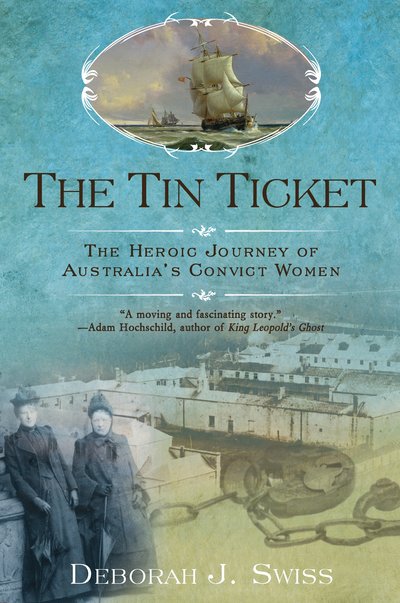Book Review: The Tin Ticket by Deborah J. Swiss
The Heroic Journey of Australia’s Convict Women

“Under the Transportation Act, 162,000 women, men and children were exiled to Australia from 1788 – 1868.”
“During the nineteenth century, twenty-five thousand women were discarded by their homeland.”
I was aware of male convicts being sent from the UK to Australia and forced into hard labour but I was completely unaware that many female convicts were deported as well.
This book helps the reader to understand the social and economic conditions of the times that led to so many women and girls being shipped to Australia.
In particular, the book follows the stories of two girls from the slums of Glasgow and a widow from London. We find out about their backgrounds and the circumstances that led to their petty thieving and subsequent convictions. They survive the hell-hole of Newgate Prison (London) and the voyage to Tasmania only to face great hardships in Australia as they serve out their laborious seven to ten year sentences. These three women are fortunate to survive the rigors of primitive conditions, slave labour and harsh treatment and eventually make a life for themselves as free citizens in Australia.
The book is well-researched and very readable. The story does jump around a bit between different characters which may cause a little confusion. It wasn’t a problem for me as I’m an impatient reader who dives in all over the place anyway! Some people criticise it for excessive use of adjectives and that it reads like historical fiction in places and I’d agree with this but to me these are only minor quibbles. The fact is that I knew nothing of the convict women sent to Australia and the book provided a very readable introduction to their story.
After reading this book I can’t help but ponder on the plight of the poor and the destitute in our society. Do we harden our heart to their predicament and blame them for the position they find themselves in? Our own society races on with research and development into Artificial Intelligence and Robotics. Of those now employed, how many will still be employed in five or ten years from now? What will society look like in terms of distribution of power, wealth and resources? I found this story very thought-provoking.
In conclusion I must mention a surprising female character from the wealthy class in London, a Quaker reformer named Elizabeth Gurney Fry. In January 1813 a male Quaker minister (bless him!) had visited Newgate Prison and had found out for himself the unspeakable conditions in which the female prisoners were confined. The very next day Elizabeth Fry and a close female friend went into Newgate Prison and experienced the filth and degradation for themselves (they insisted on being let into the very cell with the prisoners). She asked them what they wanted and then immediately set out to assist them in very practical ways. The important thing here is that while she was to offer great practical assistance she also worked hard politically as well. “A radical for her time, Elizabeth Fry was the first woman to speak before Parliament, lobbying on behalf of prison reform”.
I found this book very educational, thought-provoking and challenging and I hope more people will be inspired to read it. I found it in Dunedin Public Library (NZ) so try your local public library. If they don’t stock it then ask them to interloan it for you.
This Book Review by Exploring Colour (2017)
Sounds interesting, I bought it. Great review.
LikeLiked by 1 person
I was so happy to get your feedback Sherry. Thanks for taking the time to leave this comment.
LikeLiked by 1 person
My mother is Australian. I like to learn more about AU
LikeLiked by 1 person